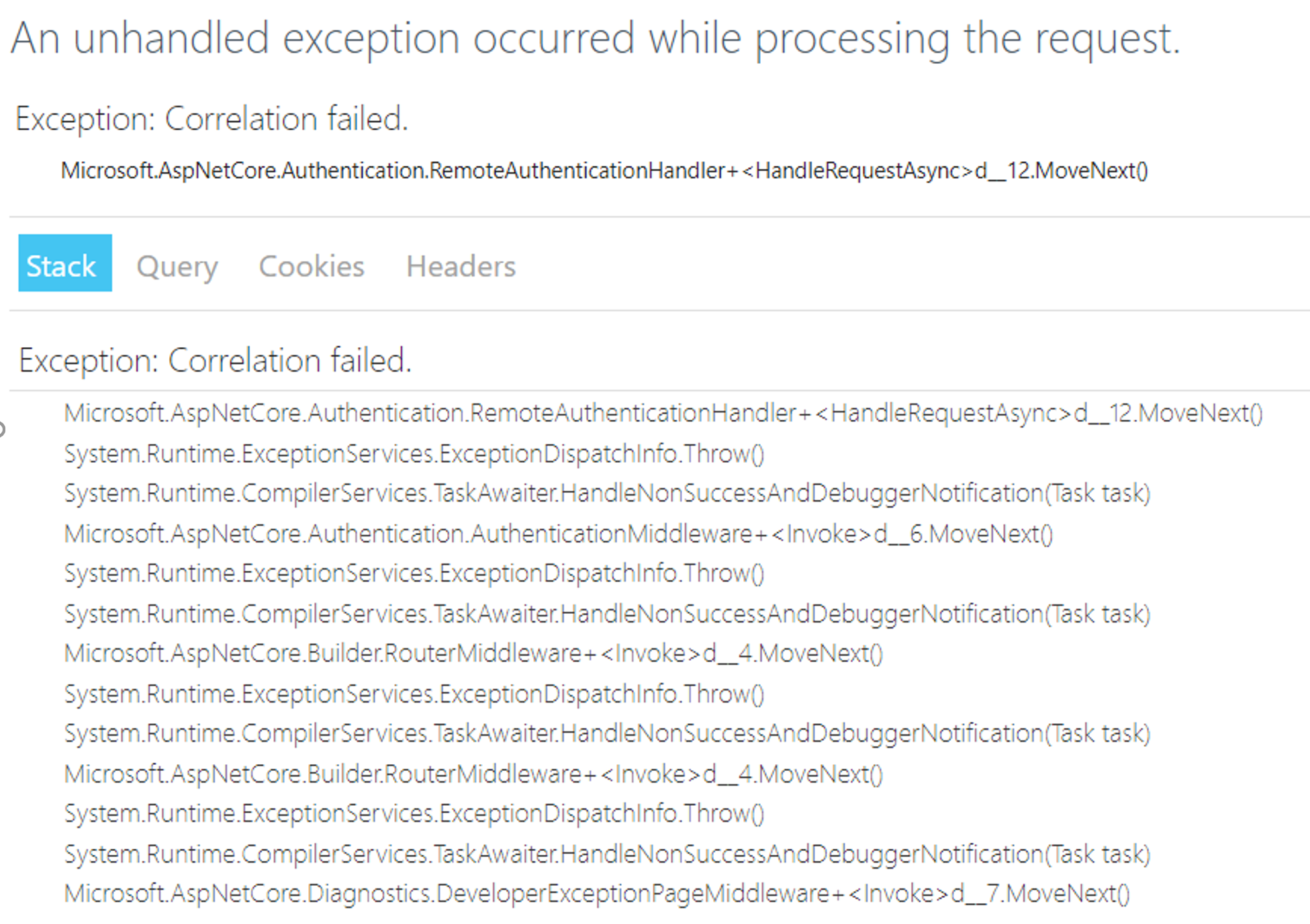I am hitting this with the following combination:
Code is rather plain vanilla OIDC authN + cookies.
services.AddAuthentication(options =>
{
options.DefaultScheme = CookieAuthenticationDefaults.AuthenticationScheme;
options.DefaultChallengeScheme = OpenIdConnectDefaults.AuthenticationScheme;
})
.AddAzureAd(options => {
Configuration.Bind("AzureAd", options);
})
.AddCookie(p => p.SlidingExpiration = true);
I am forwarding the X-Forwarded-Proto header to the auth middleware as recommended so the redirect_uri uses the correct protocol scheme.
HANDLING IN CODE
I tried to handle the OnRemoteFailure() event, and redirect to "/Home/AuthRedirect" which is an anon page that waits for 20 secs, and then redirects to the "/" (home page). It seems to work sometimes, but not always. I am out of ideas.
WORKAROUND
DETAILS
System.Exception: Correlation failed. at Microsoft.AspNetCore.Authentication.RemoteAuthenticationHandler`1.d__12.MoveNext() --- End of stack trace from previous location where exception was thrown --- at System.Runtime.ExceptionServices.ExceptionDispatchInfo.Throw() at System.Runtime.CompilerServices.TaskAwaiter.HandleNonSuccessAndDebuggerNotification(Task task) at Microsoft.AspNetCore.Authentication.AuthenticationMiddleware.d__6.MoveNext() --- End of stack trace from previous location where exception was thrown --- at System.Runtime.ExceptionServices.ExceptionDispatchInfo.Throw() at System.Runtime.CompilerServices.TaskAwaiter.HandleNonSuccessAndDebuggerNotification(Task task) at Microsoft.AspNetCore.Builder.RouterMiddleware.d__4.MoveNext() --- End of stack trace from previous location where exception was thrown --- at System.Runtime.ExceptionServices.ExceptionDispatchInfo.Throw() at System.Runtime.CompilerServices.TaskAwaiter.HandleNonSuccessAndDebuggerNotification(Task task) at Microsoft.AspNetCore.Builder.RouterMiddleware.d__4.MoveNext() --- End of stack trace from previous location where exception was thrown --- at System.Runtime.ExceptionServices.ExceptionDispatchInfo.Throw() at System.Runtime.CompilerServices.TaskAwaiter.HandleNonSuccessAndDebuggerNotification(Task task) at Microsoft.AspNetCore.Diagnostics.DeveloperExceptionPageMiddleware.d__7.MoveNext()

I had a similar Correlation error in Chrome but not Safari... turns out that when SameSite.None is being used you must run your custom site (even localhost) using https. That solved all my correlation woes.
I had the same problem, but my issue was due to my understanding of auth workflow, which was wrong. There are two callback URLs that are important, and I thought they serve the same purpose. I was so wrong.
This is defined in Startup.cs
.AddOpenIdConnect("Auth0", options =>
{
options.CallbackPath = new PathString("/signin-auth0");
It tells the authorisation middleware in your app, on which URL it should listen, once auth provider gets back after successful authentication. Then the middleware itself will redirect the application to the callback URL defined in your Login action (sample code is below).
After that (two days of struggle), everything started working.
public class AccountController : Controller
{
[HttpGet]
public async Task Login()
{
await HttpContext.ChallengeAsync("Auth0", new AuthenticationProperties() { RedirectUri = "/my-callback-page" });
}
}
I had the same issue. I was defining multiple external endpoints for Authorization. In my case I had defined Callback Paths that were being used by multiple clients. Once I defined unique Callback Paths the problem was solved: example:
options.Authority = …..";
.
.
options.CallbackPath = "/signin-idsrv2"; // I already had /sign-in-idsrv
Similarly, make sure the SignedOutCallbackPaths are unique.
Hope it works for you.
If you love us? You can donate to us via Paypal or buy me a coffee so we can maintain and grow! Thank you!
Donate Us With